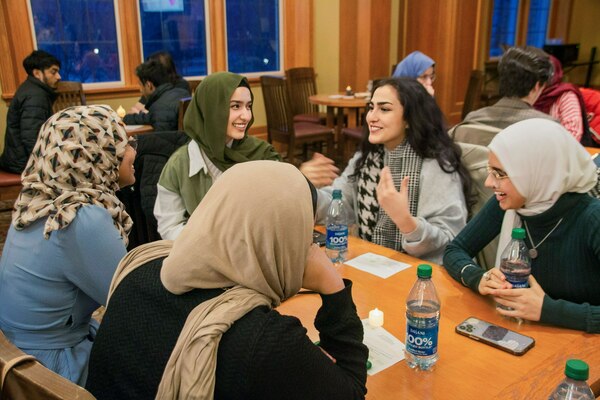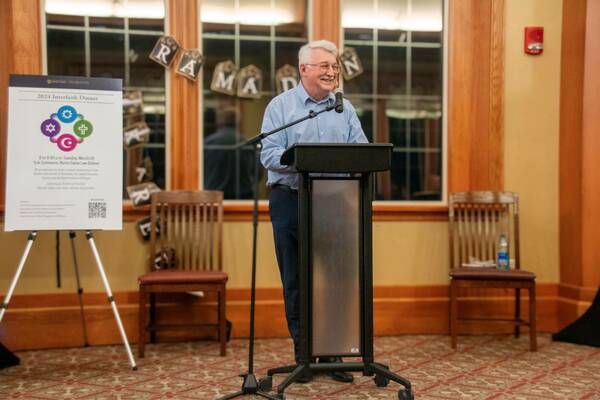
On March 26, students and faculty from across the University of Notre Dame community gathered at Notre Dame Law School to share a meal in observance of the Muslim holy month of Ramadan, the Jewish Passover, Easter, and the Bahá'í festival of Ridván. The third annual Law School Interfaith Dinner was sponsored by Notre Dame Law School’s Office of Diversity, Equity, and Inclusion, the Notre Dame Law School Religious Liberty Initiative, the Middle Eastern Law Students Association, and the Ansari Institute for Global Engagement with Religion.
During the dinner, Rabbi Karen Companez, Dean G. Marcus Cole, Dr. Robert Stockman, and Dr. Mahan Mirza shared their insights on the holidays of Passover, Easter, Ridván, and Ramadan, respectively, and illustrated that interfaith dialogue can serve as a powerful catalyst for building bridges of peace, understanding, and tolerance.
“The Notre Dame Law School community is blessed with a rich tapestry of faith traditions. Our annual Interfaith Dinner provides a unique opportunity for us to celebrate these traditions, engage in meaningful dialogue, and embrace one another with open hearts, minds, and spirits,” said Max Gaston, director of Diversity, Equity, and Inclusion at the Law School.

The event began with a traditional Islamic prayer recited by Mirza, the executive director of the Ansari Institute, to mark the breaking of the fast after sunset. Muslim attendees observing Ramadan broke their fast with dates and water, and convened in a corner of the venue to complete their evening prayers before sharing a communal meal.
Suzanne Dunne, senior director of finance and administration at Notre Dame Law School, said, “I was especially moved by those of the Muslim faith sharing their prayer to break Ramadan fast and allowing non-Muslims to observe their evening prayers.”
She added, “Notre Dame is an intersection of culture and faiths in America. As we strive to create an inclusive environment, it's not enough to tell students and faculty that Notre Dame welcomes different religions; we must show our welcoming spirit through events like the Interfaith Dinner.”
The discussion portion of the dinner began with remarks about the Jewish holiday of Passover from Rabbi Karen Companez of Temple Beth-El in South Bend, Indiana. Companez provided an overview of the significance of Passover, which commemorates the liberation of the Hebrews from slavery in ancient Egypt.
She explained the various components of the Passover Seder, a ritual feast at the beginning of Passover. The meal traditionally includes parsley dipped in saltwater, and matzah bread. Companez shared details about the symbolism behind the meal, stating that the parsley dipped in saltwater serves as a reminder of the tears shed during the Hebrews’ slavery in Egypt. Moreover, since leaven is believed to be a symbol of sin, to begin the Passover season by eating only unleavened bread is symbolic of beginning a life free from sin.
Dean G. Marcus Cole spoke next about Christianity and emphasized the importance of understanding Passover in order to understand Easter. He drew a parallel between the Passover sacrifice of the lambs by the Hebrews in Egypt and the sacrifice of Jesus on the cross to save humanity from sin.
“It was His blood that was spread, not on the doorpost, but instead, on the posts that form the cross,” Cole said. “Easter is, for us Christians, our Passover.”
Cole advocated for building unity among people of different faiths while also respecting diverse beliefs and perspectives.
“My prayer for you tonight is that we use this occasion to come together as different people — for members of the same community to celebrate what’s important in our lives and what’s important to each other,” Cole said.

Dr. Robert Stockman, an affiliated faculty member with the Ansari Institute, then spoke about the festival of Ridván, a twelve-day festival that celebrates the beginnings of the Bahá'í Faith in 1863. Ridván will begin on April 21, exactly 31 days after the celebration of the New Year (Naw-Ruz).
Dr. Mahan Mirza gave concluding remarks about Ramadan — the ninth month of the Muslim calendar, the holy month of fasting, and the month in which the Quran was believed to be revealed to Prophet Mohammed. Fasting during the month of Ramadan represents an important act of worship that teaches self-discipline, empathy, and spiritual awareness, Mirza said.
“Fasting was prescribed to communities that came before you, so that you can learn self-restraint, where you can pull yourself back from even things that are otherwise permitted and lawful, things that are even necessary to sustain life, for which we have natural desires, urges, and appetites,” he said, referring to Quranic teachings. “It is spiritual training.”
Carmen Rosa Rida, a second-year student at Notre Dame Law School, stated, “Notre Dame Law School prides itself on educating a ‘Different Kind of Lawyer’ and the Interfaith Dinner is one way in which the Law School engages its students to learn about and respect different religious customs and practices.
“For me personally, as a Muslim that has grown up surrounded by a large Muslim community, having students of all backgrounds and faiths gather to break bread reminded me of home and all the beauty that the month of Ramadan has to offer,” she reflected.
Shahad Al Wuhaili, an undergraduate student who is involved in the University of Notre Dame’s Muslim Student Association, added, “It is extremely valuable to have interfaith conversations, especially at a Catholic institution, and Notre Dame Law School hosted this event in the best way possible. I know I learned some things I did not know about some religions, and I'm sure many people shared that experience, as well.”
The third annual Law School Interfaith Dinner called attention to the importance of interfaith understanding in promoting peace, coexistence, and social harmony. In a world where religious diversity is both a source of richness and, at times, tension, the Interfaith Dinner provided an opportunity to celebrate the diversity among different faith traditions while recognizing the unifying virtues present in many religious communities.
Originally published by at law.nd.edu on April 11, 2024.